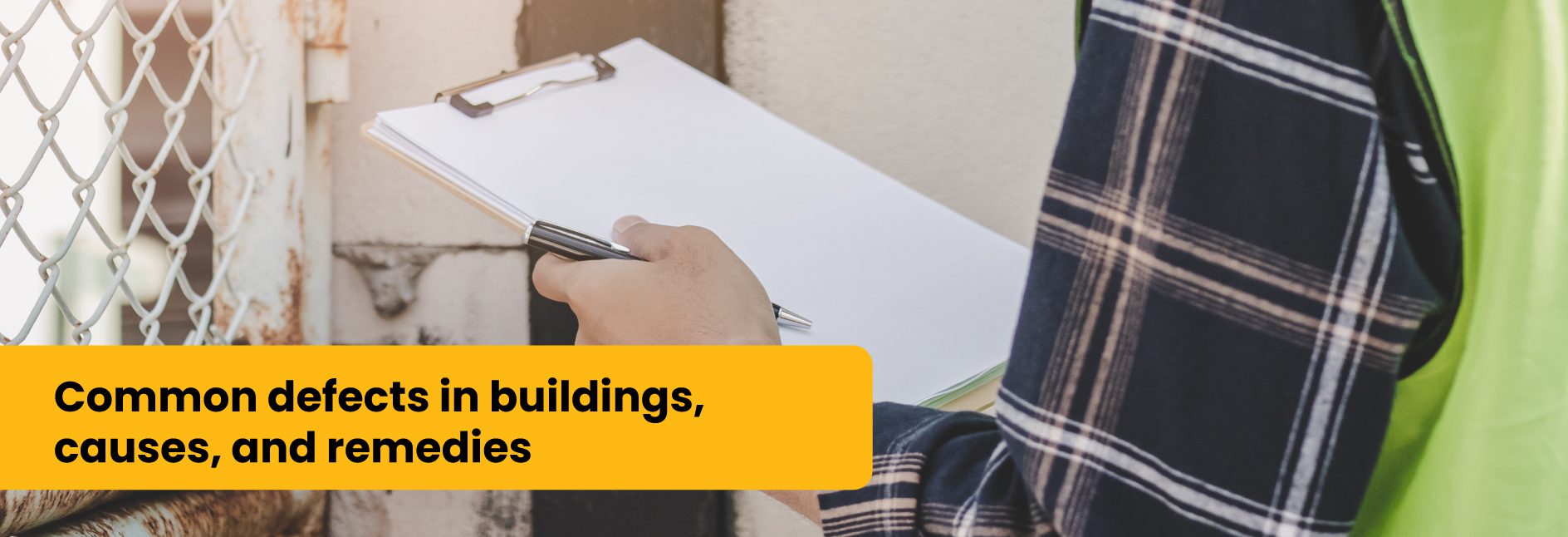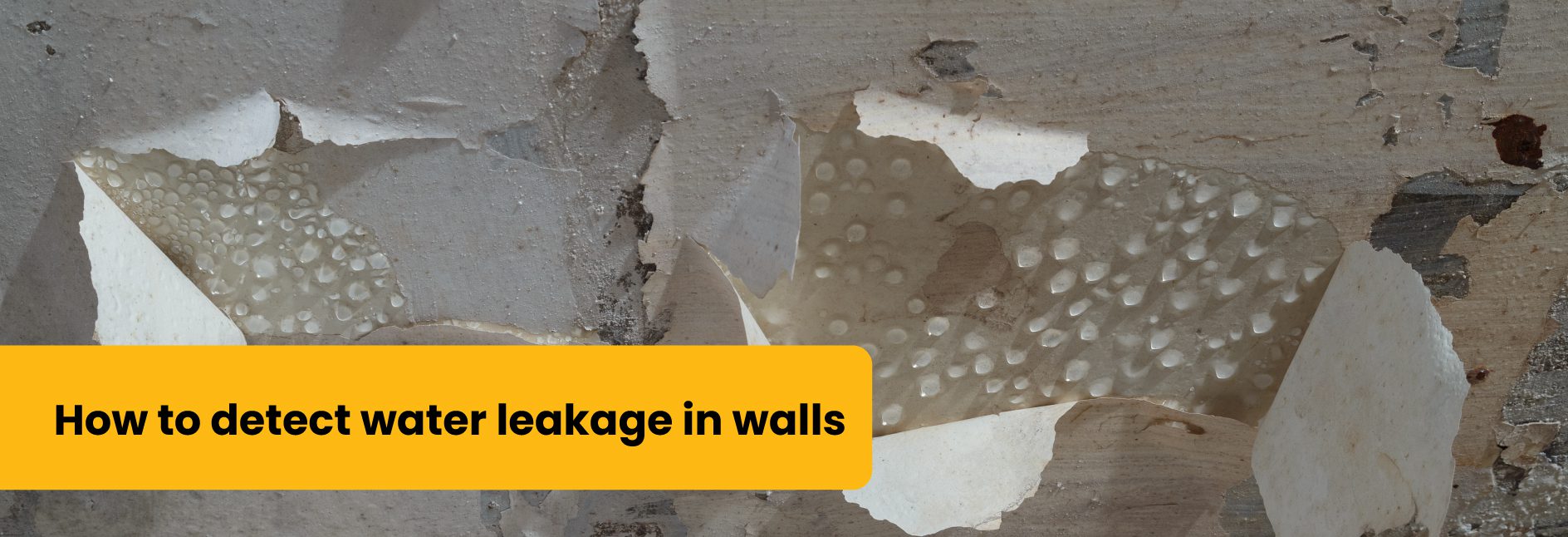Every year the rain brings with it joy but also certain issues. One such issue could be water leaking from outside wall. Water leakage is not only a problem faced seasonally. There are other reasons for water leakage in walls. Repairing leaking walls is important. In this article, we will be looking at how to detect a leak behind the wall, what tools can be used for the same and how a leaking wall inside or outside can be repaired. By the end of this article, you will have all the information you need regarding wall leakage, wall leakage detector and the solution for the same.
Introduction
Before we find out how to detect a leak in a wall, let us answer the question of what a water leakage in a wall is, how it can be caused and how it affects your home.
Direct long-term exposure to the sun, heat, winds and rains causes the development of cracks and fissures in the walls of buildings. These cracks create the space for water to seep into your house. The seepage of water or water leakage in walls creates damps and gives a very unpleasant look to your house. At a deeper level, the iron base of your home gets corroded, the bricks might get disintegrated, and the structure might weaken due to the water seeping in. A wall leakage detector or a water meter can be used by you to identify the exact location of the leak in order to be able to repair the same. Other ways of doing so are by identifying the signs of leakage behind walls or booking a house inspection service with professionals from PropCheck. This will help you know the right water leakage in wall solution to help fix the issue.
In the upcoming sections of this article, we will be looking at how to detect leakage in walls in detail.
11 Signs Of Water Leakage Behind The Wall
If you wish to detect water leakage in the wall, you can look for the same signs.
- Look for standing puddles of water near a wall.
To begin with, how to detect a leak in the wall, we have the first and simplest step: to look for any puddles of water near walls, kitchen sinks, taps, etc.
- Look for discolouration on a wall.
Discoloured walls are also a sign of wall water leakage. You can use your wall water leakage detector at points where the walls are discoloured to detect any leakages behind the wall.
- Inspect walls for a change in texture.
Other than a change in colour, you can also look for a change in the texture of your wall to detect wall leakage in order to find a wall water leakage solution. You might find bubble formations or downward bulges in the wall.
- Note any signs of mold or mildew.
Leaks that have been there for a longer time will lead to the development of mold. If you see any signs of mold, the water leakage in the wall solution you choose will be different.
- Pay attention to any musty smells.
Before you look for leakage solutions for walls, you need to be sure of the leakage that exists. Often you might not find any visible signs and will have to detect the leaks with the help of odour and musty smells.
- Listen for dripping sounds.
You can also detect water leakage in walls with the help of dripping sounds from any pipes, sinks or other appliances.
- Keep an eye on your water bill.
An increase in the water bill without any change in consumption is a great indication that you are in need of wall water leakage repair.
- Confirm whether the leak is coming from defective plumbing.
When detecting wall leakages, you can make use of tools for detecting water leaks in walls. You must look out for the cause of the leaks and determine whether the leak is due to defective plumbing.
- Check for clogged eaves and downspouts.
Clogging of eaves and downspouts due to very heavy rainfall can also be a cause of water leakage in walls. You can check for the same when identifying any leakages.
- Check for leaks in the foundation walls.
Another source can be the seepage of water through the foundation walls. You can identify this with the help of a water leak detector inside the wall.
- Scan for moisture inside walls with a moisture meter.
A moisture metre is a device that will be the wall leakage scanner and help you detect any water leakage in your walls. You can use this water leakage scanning device which will calculate the moisture content in the wall when placed against it.
How To Fix Water Leakage From The Wall?
Water leakage in walls can be detected using a wall leakage scanner. Once the leakage has been detected by you or a professional that you approach for help, the next step is the repair work and prevention of the same in the future. In this section, we will be talking about water leakage solutions for walls. The following steps will help you know how wall water leakage repair work can be done to protect your walls from irreparable damage.
- Confirm the wall leak
As we have discussed how to detect a leak behind a wall, you can check for signs of leakage inside your house. You can also make use of a water leakage scanner to get help with confirming the wall leak.
- Zero in on the leak
Before you find out the water leakage solution, you need to zero in on the source of water leakage. Knowing the reason for leakage will help you find the right repair services that you need for your walls.
- Repair the pipe
If it is not a rainwater leakage from the wall but an issue with the plumbing system, it is important that you get your pipes repaired at the earliest. This will not only help you get rid of the water leakage but also help save on water bills every month.
- Mop and dry
If there is water leaking from outside wall, you need to ensure that the water does not collect in a puddle on the floor nearby. You must mop and dry these areas ensuring the areas are clean. This will also help protect your floors from damage.
- Clean all surfaces
Ensuring the cleanliness is important to avoid the after-effects of water leakage in walls. Ensure that your kitchens, washrooms and shower areas are clean and dry. Making use of a good exhaust fan will help reduce humidity.
- Take care of mold
When there is a situation of water leaking through walls, mold development is super common. Surface molds commonly grow on damp surfaces, and it is important to scrub them off immediately when they form. You can scrub-off molds with a detergent, clean with water and let the surface dry completely.
- Let professionals finish the job.
This should be your go-to option. Get in touch with professionals from PropCheck, who will be visiting you for a house inspection and providing the right water leakage solution for wall.
Conclusion
As we conclude this guide, we hope that you will now understand wall leaks in detail and also know how you can detect any water leakage in walls at your home. In this article, we have not only talked about how you can detect leakage in walls but also shared the wall water leakage solution to help you fix these issues at home or any new property that you are looking at. Keeping your walls water-leakage proof is important. One of the simplest ways of doing so is by getting professional advice using the house inspection services at PropChk.
FAQs
While we have discussed almost all aspects of water leakage through walls, you might still have a few doubts and queries regarding the same. In this section, we will be looking at some of the most commonly asked questions related to the wall water leakage detector and the water leakage solution for the wall.
How do you tell if a water leak is inside or outside?
The first step to detecting where the leakage is is turning off all the water sources inside the house. You can use a wall leakage detector inside the wall or outside the wall to check where the leakage is.
How do I know if my water is slowly leaking behind the wall?
To find out if water is slowly leaking behind the walls, you might need a tool for detecting water leaks in walls. You can also get professional help by booking a house inspection service. To know more about water leakage behind walls on your own, you can check for signs of water leakage.
Why is rain coming through my walls?
Rainwater leakage from walls is a common issue during monsoons in the country. Through the beam joints in the building, the water from the external walls seeps in when it rains. The interior parts of the walls are damaged due to this moisture from the seepage during the rains.





